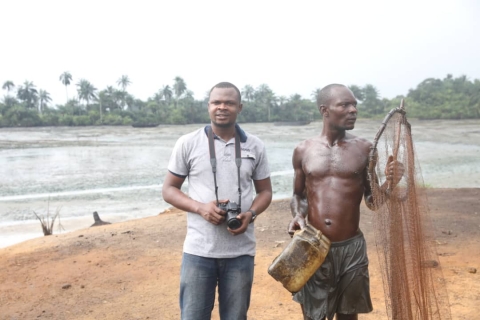After two Nigerian journalists used blood tests to show that oil spilled more than a decade ago was still poisoning Niger Delta townships through their well water, the national government announced it would hire contractors to provide potable water to the affected communities.
The move came four months after freelance journalists Kelechukwu Iruoma and Ruth Olurounbi reported that more than half of residents who gave blood samples as part of the six-month investigation had dangerously high levels of an enzyme that is a marker for liver damage.
The government’s promise to hire contractors to provide safe drinking water also came nearly a decade after a United Nations Environment Programme (UNEP) report called on the Nigerian government and oil companies to share the cost of extensive restoration of the area. That includes providing running water to farming and fishing communities whose landscapes and public health had been devastated by multiple oil spills.
Yet progress on cleanup has been slow, so Iruoma and Olurounbi set out to show how toxins lingering in the environment continued to damage the health of residents. They applied for and received an ICFJ Alumni Reporting Grant to support their investigation.
To report the story, Iruoma and Olurounbi worked with health professionals to conduct lab testing on people living in Ogoniland, a kingdom in southern Nigeria’s Rivers State hit by the country’s first major oil spill in 1970. An average of 240,000 barrels of crude oil are spilled in the delta every year, according to the Nigerian Medical Journal. Studies link oil spills to cancer, childhood malnutrition and low fertility.

The reporters visited four communities where wells were contaminated with benzene, a known carcinogen at levels over 900 times above the World Health Organization (WHO) guideline. They engaged local leaders to enlist 50 non-smoking, non-alcohol-drinking residents to give blood samples, which the reporters brought to a lab in Lagos for evaluation. More than half of the people tested showed “elevated liver enzymes [which] may indicate damage to the liver cells and such patients might be prone to liver disease,” said a doctor the reporters interviewed.
They also used drones to show the extent of environmental wreckage in the area, and interviewed residents, leaders and local scientists.
“The speed of the cleanup is so slow that the desired results will not be achieved,” an environmental scientist and Ogoniland resident told the reporters. “This is what the people have been living with all through their lives. This is suicide.”
The journalists from Nigeria received an ICFJ Alumni Reporting Grant which included $7,500 plus hands-on training in using drones and creating infographics. Iruoma and Olurounbi used the funds to pay for the blood tests and for travel to the region.
Backed by Microsoft’s Modern Journalism program, the grants were created to support data journalism and immersive storytelling. Applications were open to alumni of previous ICFJ programs. Iruoma participated in ICFJ’s Reporting Fellowship on Migration and Climate for Nigerian Journalists in 2017. Olurounbi is a member of the Nigerian chapter of WanaData, a network of female journalists developed by ICFJ and Code for Africa that is driving digital storytelling across the continent.
This story has been shortlisted in the Excellence in Environmental Journalism category of the Fetisov Journalism Awards. The winning list will be selected by December 1, 2020.